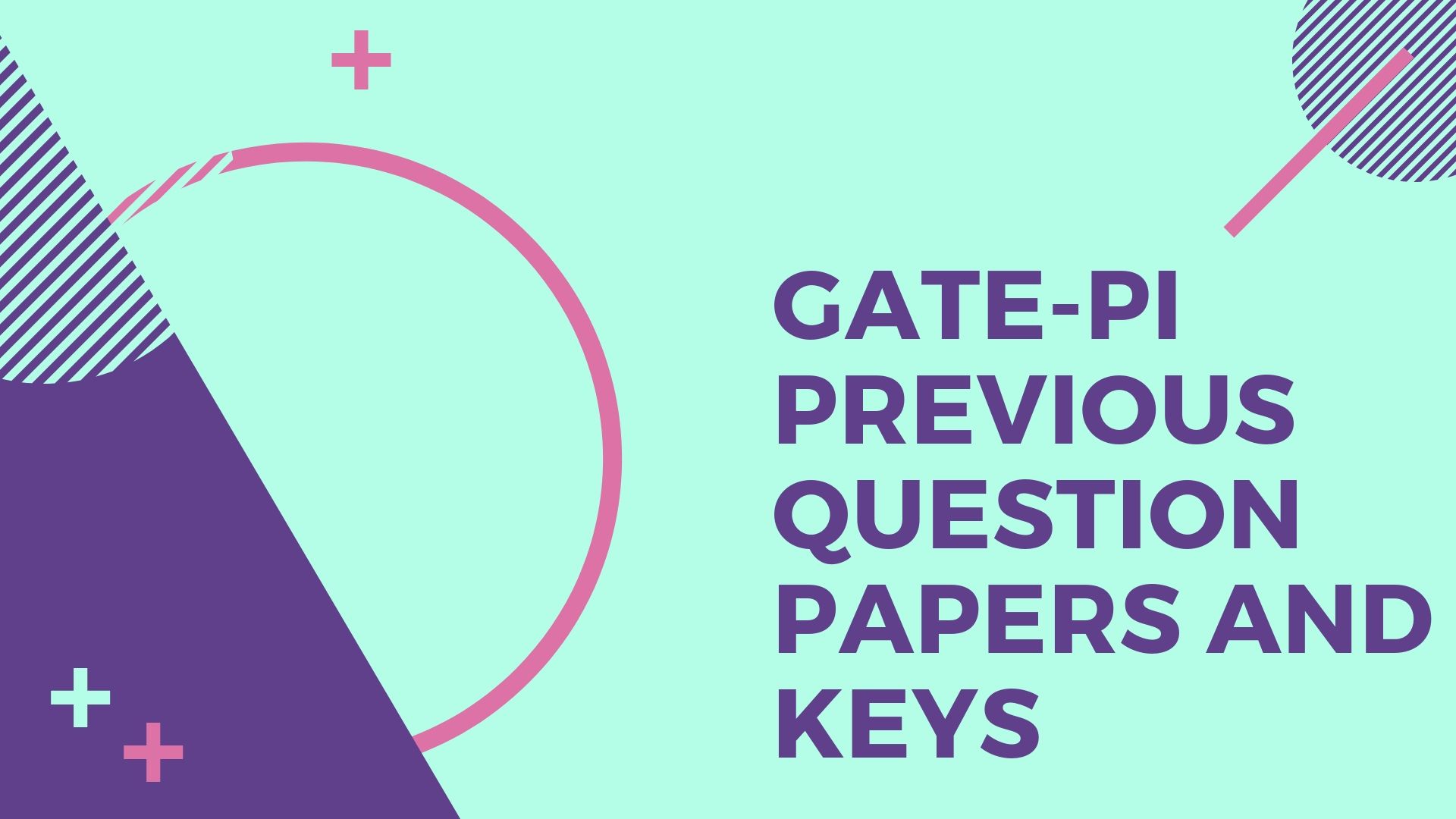Graduate Aptitude Test in Engineering (GATE) is a national level entrance examination for admissions to Post Graduation programs like M. Tech, M. Arch, ME, PH.D. etc. conducted by IISc and seven IITs on behalf of NCB –GATE and MHRD to test the knowledge of the students in the stream of Science.
The scores of the examination are accepted by more than 900+ institutes across India and it is valid for three years post announcement of results.
GATE 2020 PI Exam details and Question Paper Pattern:
The GATE 2020 will be a 3-hour duration examination which will be conducted online. The question paper has 65 questions of 1 mark and 2 mark totalling to 100 marks. The question paper is divided into three sections: General Aptitude, Engineering Mathematics, Subject-specific section.
The exam contains two types of questions:
(i) Multiple Choice Questions (MCQ)
Each MCQ would carry 1 or 2 marks and a choice of four answers are given, out of which the candidate must choose the correct answer. Note that there will be negative marking for a wrongly selected answer.
(ii) Numerical Answer Type (NAT) Questions
Each NAT question carry 1 or 2 marks and no choices are given. There is no negative marking for a wrong answer in NAT questions.
The syllabus and a collection of previous years GATE PI Question papers along with answers are provided in PDF format which can be downloaded to get a better understanding about GATE PI examination.
For latest updates on GATE 2020, visit http://gate.iitm.ac.in/
GATE PI Exam 2020 Syllabus:
- Section 1: Engineering Mathematics
Linear Algebra: Matrices and determinants, Eigen values and Eigen vectors.
Calculus: Partial derivatives; maxima and minima; Fourier series, Taylor series.
Vector Calculus: Gradient; divergence and curl; line; surface and volume integrals; Stokes, Gauss and Greens theorems.
Differential Equations: Cauchy’s and Euler’s equations; Laplace transforms; Partial Differential Equations – Laplace, Linear and non-linear first order Ordinary Differential Equations (ODE); Higher order linear ODEs with constant coefficients
Probability and Statistics: Poisson, normal and binomial distributions; correlation and regression analysis.
Numerical Methods: Solutions of linear and non-linear algebraic equations; numerical integration – trapezoidal and Simpson’s rule.
- Section 2: General Engineering
Engineering Materials: Structure and properties correlation; engineering materials; stress- strain behavior of metals and alloys; iron-carbon phase diagram.
Applied Mechanics: Engineering mechanics, equations of equilibrium; trusses; strength of materials; failure theories, Mohr’s circle(stress),
Theory of Machines and Design: Analysis of planar mechanisms; governors and fly wheels; design of bolted, riveted and welded joints; clutches; pressure vessels.
Thermal and Fluids Engineering: Bernoulli’s equation, flow through pipes, contact angle and wetting; thermodynamics; air standard cycles; heat transfer basic applications of conduction, convection and radiation.
- Section 3: Manufacturing Processes I
Casting: types of casting processes and applications; casting techniques of cast iron, analysis of solidification and microstructure development.
Metal Forming: Stress-strain relations in elastic and plastic deformation; sheet metal working processes; ideal work and slab analysis; origin of metal working defects.
Joining of materials: Principles of fusion welding processes, Principles of solid state welding processes; Principles of adhesive, brazing and soldering processes.
Polymers and Composites: Plastic processing – injection, compression and blow molding, extrusion, calendaring and thermoforming; molding of composites.
- Section 4: Manufacturing Processes II
Machine Tools and Machining; machining processes, Merchant’s analysis; basis; Jigs and fixtures; Non-traditional Manufacturing.
Computer Integrated Manufacturing: Basic concepts of CAD, Group Technology and its applications – CAPP, cellular manufacturing and FMS.
- Section 5: Quality and Reliability
Metrology and Inspection: Limits, interchangeability, selective assembly; tolerance analysis in manufacturing and assembly.
Quality management: Quality; quality assurance; statistical quality control; total quality management; ISO 9000.
Reliability and Maintenance: Distribution of failure and repair times; determination of MTBF and MTTR, reliability models; preventive maintenance and replacement.
- Section 6: Industrial Engineering
Product Design and Development: Principles of good product design; product life cycle; value engineering and analysis, concurrent engineering.
Work System Design: Taylor’s scientific management, Gilbreths’s contributions; PMTS; ergonomics.
Facility Design: Facility location factors and evaluation of alternate locations; computer aided layout design techniques; assembly line balancing; materials handling systems.
Section 7: Operations research and Operations management
Operation Research: Linear programming; transportation and assignment models; Lagrange multipliers; Markovian queuing models.
Engineering Economy and Costing: Elementary cost accounting and methods of depreciation; break-even analysis, resource levelling.
Production control: Forecasting techniques, trend and seasonality; aggregate production planning; MRP and MRP-II; Logistics, and supply chain management; Inventory. Project management – PERT and CPM.
Click on GATE 2019 Production and Industrial Engineering (PI)Syllabus to get the detailed syllabus
10 GATE PI Previous Years Question Papers with keys :
Download the last year question papers and answer keys of GATE PI Exam from the links given below
| Sl. No | Year of GATE PI Exam | Download Link of GATE PI Previous papers and Answer keys |
| 1 | 2019 | Download |
| 2 | 2018 | Download |
| 3 | 2017 | Download |
| 4 | 2016 | Download |
| 6 | 2007-2015 | Download |
For latest updates on GATE, visit http://gate.iitm.ac.in/
